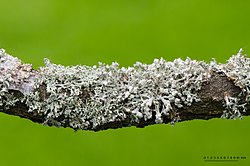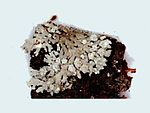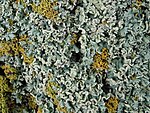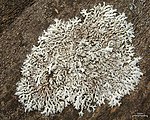Physcia
| Physcia | |
 Physcia tenella och Physcia adscendens. | |
| Systematik | |
|---|---|
| Domän | Eukaryoter Eukaryota |
| Rike | Svampar Fungi |
| Division | Sporsäcksvampar Ascomycota |
| Klass | Lecanoromycetes |
| Ordning | Teloschistales |
| Familj | Physciaceae |
| Släkte | Physcia |
| Vetenskapligt namn | |
| § Physcia | |
Physcia är ett släkte av lavar. Physcia ingår i familjen Physciaceae, ordningen Teloschistales, klassen Lecanoromycetes, divisionen sporsäcksvampar och riket svampar.[1][2]
Physcia har en smalt bladformig eller busklik bål, barklager på bägge sidor, av grönalger bildade gonidier, svartbruna, i bålens kant sittande apotecier och tvårummiga ellipsoidiska sporer.[3]
Släktet namngavs 1803 av Michaux. 2008 beskrevs och namngavs 11 nya arter i släktet av Roland Moberg.[4]
Arter
Följande arter listas i Catalogue of Life som ingående arter i släktet:[1]
- Physcia aipolia
- Physcia alba
- Physcia albata
- Physcia atrostriata
- Physcia biziana
- Physcia caesia
- Physcia cinerea
- Physcia clementei
- Physcia convexa
- Physcia convexella
- Physcia crispa
- Physcia dimidiata
- Physcia dubia
- Physcia erumpens
- Physcia halei
- Physcia integrata
- Physcia krogiae
- Physcia magnussonii
- Physcia nashii
- Physcia neglecta
- Physcia phaea
- Physcia poncinsii
- Physcia pseudospeciosa
- Physcia rolfii
- Physcia semipinnata
- Physcia sinuosa
- Physcia sorediosa
- Physcia stellaris
- Physcia tenella
- Physcia tenellula
- Physcia tretiachii
- Physcia tribacia
- Physcia tribacioides
- Physcia undulata
- Physcia villosula
- Physcia vitii
- Physcia decorticata
- Physcia jackii
- Physcia nubila
- Physcia austrocaesia
- Physcia caesiopsis
- Physcia neonubila
- Physcia rolandii
- Physcia verdonii
Bilder
- Physcia adscendens
- Physcia aipolia
- Physcia americana
- Physcia biziana
- Physcia caesia
- Physcia dubia
- Physcia leptalea
- Physcia millegrana
- Physcia pseudospeciosa
- Physcia stellaris
- Physcia subtilis
- Physcia tenella
Källor
- ^ [a b] Bisby F.A., Roskov Y.R., Orrell T.M., Nicolson D., Paglinawan L.E., Bailly N., Kirk P.M., Bourgoin T., Baillargeon G., Ouvrard D. (red.) (12 augusti 2011). ”Species 2000 & ITIS Catalogue of Life: 2011 Annual Checklist.”. Species 2000: Reading, UK. http://www.catalogueoflife.org/annual-checklist/2011/search/all/key/physcia/match/1. Läst 24 september 2012.
- ^ Dyntaxa Physcia
- ^ Carlquist, Gunnar, red (1937). Svensk uppslagsbok. Bd 21. Malmö: Svensk uppslagsbok AB. sid. 595
- ^ "The lichen genus Physcia in Central and South America". Nordic Journal of Botany (s. 319–342), Vol.10:3, september 1990. Läst 11 februari 2015. (engelska)
Externa länkar
Media som används på denna webbplats
Författare/Upphovsman: Jason Hollinger, Licens: CC BY 2.0
Physcia subtilis 20091027.29
US, NC, Nantahala GorgeFörfattare/Upphovsman: chloeheartsowls, Licens: CC BY-SA 3.0
The lichen Physcia millegrana Degel. Specimen photographed in Tecumseh, Michigan, USA. "Notes: on log"
Författare/Upphovsman: Jerzy Opioła, Licens: CC BY-SA 3.0
Physcia dubia (gray) and Xanthoria candelaria (yellow-green)
Physcia leptalea, Île aux Vaches, Esquibien, Finistère, Bretagne, France
Författare/Upphovsman: Jerzy Opioła, Licens: CC BY-SA 4.0
Physcia caesia (location: Poland, Pieniny, Wąwóz Szopczański)
Författare/Upphovsman: Udo Schmidt from Deutschland, Licens: CC BY-SA 2.0
Zarte Schwielenflechte, Lichenes, Deutschland, Bayern, Oberfranken, Selbitz
Photo: U.Schmidt, 10.X.2012Författare/Upphovsman: Jerzy Opioła, Licens: CC BY-SA 4.0
Physcia stellaris (location: Poland, Pieniny, Sromowce Niżne)
Författare/Upphovsman: Ed Uebel, Licens: CC BY-SA 3.0
Physcia americana G. Merrill, 1926
Photograph of a herbarium specimen.
[Lower surface white; soredia laminal; lobes ca. 0.8 mm wide; cortex K+ yellow, C-; medulla K+ yellow, C-]
This specimen of Physcia americana was growing on the bark of a dying Norway Maple (Acer platanoides L.) in a front yard along Ridge Road in western Baltimore County, Maryland, USA.
Collected and identified by E.C. Uebel (No. U-313, 23 Aug 2001).Författare/Upphovsman: Jason Hollinger, Licens: CC BY 2.0
Scientific Name: Physcia biziana (A. Massal.) Zahlbr. Common Name: Frosted Rosette Lichen Certainty: positive (notes)
Scientific Name: Lecanora muralis (Schaerer) Rabenh. Common Name: Stonewall Rim-Lichen Certainty: not sure (notes)
Location: Southern California; San Gabriel Mts; Mt Gleason
Date: 20081015Författare/Upphovsman: Ed Uebel, Licens: CC BY-SA 3.0
Physcia pseudospeciosa J.W. Thomson, 1963 (photograph of a herbarium specimen) Growing on vertical acidic rock in woods at Falls Road and Gunpowder River, Baltimore County, Maryland, USA; collected and identified by Allen C. Skorepa (No. 7504, 16 Jan 1974); specimen is now in the Lichen Herbarium of the New York Botanical Garden.
Författare/Upphovsman: Jerzy Opioła, Licens: CC BY-SA 4.0
Physcia aipolia (location: Poland, Limanowa, Miejska Góra)
Författare/Upphovsman: Norbert Nagel, Licens: CC BY-SA 3.0
Physcia adscendens (lichen), Hesse, Germany on a branch of an apple tree. Lichens are interesting life forms: fungi hold algae captive in a way, that their relationship is in-between a symbiosis and purely parasitic, also described as controlled parasitism.
The lichen species was kindly assigned by Prof. Volkmar Wirth (Cf. "Farbatlas Flechten und Moose" by Volkmar Wirth and Ruprecht Düll, Eugen Ullmer GmbH, 2000, ISBN 3-8001-3517-5.)
Författare/Upphovsman: Norbert Nagel, Licens: CC BY-SA 3.0
Physcia tenella and Physcia adscendens) on a branch in Hesse, Germany. Lichens are interesting life forms: fungi hold algae captive in a way, that their relationship is in-between a symbiosis and purely parasitic, also described as controlled parasitism.
The lichen species was assigned using the book, "Farbatlas Flechten und Moose" by Volkmar Wirth and Ruprecht Düll, Eugen Ullmer GmbH, 2000, ISBN 3-8001-3517-5. Please contact me, if you think that it is a different species.
























